- Home
- W. Somerset Maugham
A Writer's Notebook Page 17
A Writer's Notebook Read online
Page 17
There is a deep streak of masochism in Russians. Sacher Masoch was himself a Slav and first drew notice to the malady in a volume of short stories which are not otherwise remarkable. According to the reminiscences of his wife he was himself a victim of the state he described. Briefly, it is a sexual desire in a man to be subjected to ill treatment, physical and mental, by the woman he loves. For example, Sacher Masoch himself insisted on his wife going for a trip with a lover while he, disguised as a footman, suffering agonies of jealousy, performed for the couple a variety of menial services. In Sacher Masoch’s stories the women are described as large and strong, energetic, audacious and cruel. They use men with every sort of indignity. Russian fiction is full of characters of this sort. Dostoievsky’s heroines are of this overbearing type; tenderness, sweetness, gentleness, charm do not appeal to the men who love them; on the contrary they find a horrible delight in the outrages to which they are exposed. They want to abase themselves. Turgenev’s heroines are intelligent, alert, active and enterprising, while the men are weak of will, dreamers incapable of action. It is a characteristic of Russian fiction, and I imagine it corresponds to a deep-rooted instinct in the Russian character. No one can have lived among Russians without being struck by the aggressive way in which women treat men. They seem to take a sensual pleasure in humiliating them before others; they are contentious and brutal in their conversation; the men will endure things said to them that few Englishmen would tolerate; you will see them flush at a gibe, but make no attempt to retaliate; they are femininely passive, they cry easily.
The Russian sets store on self-abasement because it comes easily to him; he can accept humiliation because to humiliate himself gives him a singular sensual gratification.
The poverty of types in Russian fiction is rather surprising. You meet the same people, under a variety of names, not only in the works of the same author but in the works of others. Alyosha and Stavrogin are the two prominent and marked types. They seem to haunt the imagination of Russian writers, and it may be supposed that they represent the two sides of Russian character, the two persons whom every Russian feels more or less in himself. And it may be that it is the presence in him of these two irreconcilable selves which makes the Russian so unbalanced and so contradictory.
It is humour which discerns the infinite diversity of human beings, and if Russian novels offer only a restricted variety of types it is perhaps because they are singularly lacking in humour. In Russian fiction you will look in vain for wit and repartee, badinage, the rapier thrust of sarcasm, the intellectual refreshment of the epigram, or the lighthearted jest. Its irony is coarse and obvious. When a Russian laughs he laughs at people and not with them; and so the objects of his humour are the vapours of hysterical women, the outrageous clothes of the provincial, the antics of the inebriated. You cannot laugh with him for his laughter is a little ill-mannered. The humour of Dostoievsky is the humour of a bar loafer who ties a kettle to a dog’s tail.
I can’t think of a single Russian novel in which one of the characters goes to a picture gallery.
The message that Russia has given to the world seems to be the simple one that in love lies the secret of the universe. In opposition to it she places will, a rival but baneful force, and her novelists are never weary of showing to what catastrophe it may bring its bondsmen. They are fascinated by it, as women are fascinated by Don Juan, but it is with horror that they contemplate its satanic power; withal they look upon it with compassion and pursue it as Christ in The Hound of Heaven pursues the hurrying soul. They do not credit it with singleness of purpose. They believe that it is divided against itself and are sure that deep down in its essence lies a spark of that love which consumes their own breasts. They rejoice, as choirs of angels singing, when it abdicates its power and comes suppliant to their waiting bosoms, and if peradventure it refuses in the end to throw itself into their outstretched arms, like good Christians they consign it to outer darkness and to gnashing of teeth.
But in making this contrast between will and love Russia is merely placing one romantic figment of the imagination in face of another. They are both appearances, and if they have been thought to be something more it is presumably because they give us so intense a feeling of reality. But they begin and end in feeling. Love, so far as it is active, partakes of the nature of the will, and so cannot reasonably be set up against it as a rival answer to the riddle of existence; but it is its passive side, its self-abnegation, its humility which have attracted the Russian temperament; it is there they find the answer they seek to the mystery which torments them. Obviously this has nothing to do with thought, it is a surrender of thought to emotion; when they say that in love is the secret of the universe they confess that they have given up the search for it. It is singular that the Russians who occupy themselves so much with questions of man’s destiny and the meaning of the world should have so little talent for metaphysical discussion. They have produced no philosopher even of the second rank. They seem to have no capacity for accurate and profound thought. Intellectually they all suffer from the malady of Oblomovism. It is interesting to enquire why this Russian message has had so great a success in Europe. The supremacy of love has had a good press. All manner of writers have been taken with it, and consciously or otherwise it has influenced their attitude. It came at a happy time. The world was disappointed with science. France, where most intellectual movements have their origin for the western world, was humbled and weary. The naturalistic school had grown dry and mechanical; Schopenhauer and Nietzsche had lost their novelty. There was a large class of educated persons interested in metaphysical questions, but with neither the education nor the patience to study metaphysical works; mysticism was in the air; and when they were told that love offered a solution of all their doubts they were more than willing to accept the statement. They thought they knew what it meant, for love is a word of many meanings and each one could give it that which was agreeable to his own experience; and the idea that this familiar feeling in some way rendered clear everything that had puzzled them gave them an emotion which they were quite ready to take for an explanation. It never occurred to them that they were trying to explain a leg of mutton in the terms of a top hat. With some the message agreed with a faith which they had never surrendered, with others it re-established one which they had given up with their heads but not with their hearts. Nor must it be forgotten that love is a grateful theme for rhetoric.
I read a work on Dostoievsky by X. It might have been written at the menopause by the virgin daughter of a clergyman. There is no reason why one should not keep one’s head about Dostoievsky. It is not necessary to read a novel with the ecstatic unction of a nun in contemplation of the Blessed Sacrament. To gush is not only tiresome to others, but unprofitable to oneself. And I think one pays a better compliment to the object of one’s admiration when one considers him with sense than when one surrenders oneself to him like a drunkard to his glass of gin. I should have thought that if an author could enthral the minds of his readers he would be willing to let who would captivate their hearts. M. Arouet de Voltaire surely holds a more distinguished place among the dead than Mr. Moody or even Mr. Sankey.
I wish someone would analyse Dostoievsky’s technique. I have an idea that, though his readers do not know it, the effect he has on them is largely due to his peculiar method. People speak sometimes as though he were negligible as a novelist, but this is not so, he is a very good novelist indeed, and he uses certain stratagems with great skill. A favourite one, which he employs constantly, is to bring together the chief persons in his story to discuss some action so outrageous that it is incomprehensible. He leads you along to an understanding of it with all the skill of Gaboriau unravelling a mystery of crime. These long conversations have a thrilling interest, and he heightens the thrill by an ingenious device: his characters are agitated quite out of proportion to the speeches they make; he describes them as trembling with excitement, green in the face or frightfully pallid, terror-stricke
n, so that a significance the reader cannot account for is given to the most ordinary words; and presently the reader is so wrought up by these extravagant gestures that his own nerves are set on edge and he is prepared to receive a real shock when something happens which otherwise would hardly have stirred his blood. An unexpected person comes in, a piece of news is announced. Dostoievsky is too good a novelist to balk at the coincidence and his characters invariably find themselves at the necessary place at the dramatic moment. It is the method of Eugène Sue. That is not condemnation. All methods are good if you have talent. Racine found it possible to express all the variety of human passion within the iron convention of the Alexandrine, and Dostoievsky with the material of melodrama has created an enduring work of art. But he is a master hard to follow, and the amiable writers who fancy for themselves the role of an English Dostoievsky may find that they have succeeded only in becoming a shadow of Eugène Sue.
Sometimes he used this method in a purely mechanical way, and then his characters are agitated for no reason at all, and the thunderclap with which the scene ends is merely a ball rolled over a piece of tin. His people then are distorted like the figures of the School of Bologna. It is empty gesture.
I do not think there is great subtlety of characterisation in Dostoievsky. His people are all of a piece. The greatest novelists have at least indicated the diversity that is in every human breast. But his men are always themselves. They are like the ‘characters’ which were fashionable exercises of the seventeenth century: there is the man of iron, all iron, the flipperty-gibbet, all flightiness, the saint, all saintliness; they are passions, qualities, defects personified and seen with extraordinary vividness, but they are seldom human beings. The world of Western Europe has naively accepted them as Russians, but the Russians I have met are not very different after all from the rest of mankind. The man of iron has his weakness, the flipperty-gibbet has a kind heart, the saint has his faults. You do not get in Dostoievsky the supreme delight the novelist can give of showing you in one person the heroism and abjectness, the infinite contrariety and the disordered richness of man. Dostoievsky has never drawn a character of so intricate a complexity as Julien Sorel.
Man is so complex, he is a fit symbol of that Absolute which we are told contains all pain and pleasure, change, time and space, in its infinite incomprehensibility. But Dostoievsky’s characters are like the persons in a morality play. They give you the impression that they are complicated because they do things that you do not understand, but a closer acquaintance shows you that in fact they are excessively simple and they always act really according to standard.
Dostoievsky reminds me of El Greco, and if El Greco seems the greater artist it is perhaps only because the time at which he lived and his environment were more favourable to the full flowering of the peculiar genius which was common to both. Both had the same faculty for making the unseen visible; both had the same violence of emotion, the same passion. Both give the effect of having walked in unknown ways of the spirit in countries where men do not breathe the air of common day. Both are tortured by the desire to express some tremendous secret, which they divine with some sense other than our five senses and which they struggle in vain to convey by use of them. Both are in anguish as they try to remember a dream which it imports tremendously for them to remember and yet which lingers always just at the rim of consciousness so that they cannot reach it. With Dostoievsky too the persons who people his vast canvases are more than life-size, and they too express themselves with strange and beautiful gestures which seem pregnant of a meaning which constantly escapes you. Both are masters of that great art, the art of significant gesture. Leonardo da Vinci, who knew somewhat of the matter, vowed it was the portrait-painter’s greatest gift.
Resurrection is a book which owes its reputation to its author’s. The moral purpose has obscured the art, and it is a tract rather than a novel. The scenes in prison, the account of the convicts’ journey to Siberia, give the unfortunate impression of having been mugged up for the occasion; but Tolstoi had great gifts and even here they are not missing. Effects of nature are described with a happy touch, at once realistic and poetic, and he can give as no one else in Russian literature the scents of the country night, the heat of midday and the mystery of dawn. His power of characterisation is extraordinary, and in Achludof, though perhaps he has not drawn quite the character he intended, with his sensuality and mysticism, his ineffectualness, his sentimentality, his muddle-headedness, his timidity and obstinacy, he has created a type in which most Russians can recognise themselves. But perhaps from a technical point of view the most remarkable thing about the book is the immense gallery of subordinate characters, some of whom appear but on a single page, who are drawn, often in three or four lines, with a distinctness and individuality which any writer must find amazing. Most of the small characters in Shakespeare’s plays are not characterised at all: they are merely names with a certain number of lines to say, and actors, who have often an accurate instinct in this matter, will tell you how great an effort it requires to put individuality into such puppets; but Tolstoi gives each man his own life and character. An ingenious commentator might devise the past and suggest the future of the most summarily sketched.
I have been reading Turgenev. I think it would be hard to find another writer who has achieved a greater reputation on such slender qualities. No other writer is so beholden for his celebrity to the exaggerated estimation in which Russian literature is held. He is a writer of the school of Octave Feuillet or Cherbuliez, and his chief merits are theirs, a well-bred sentimentality and the facile optimism of a contented mind. It would be interesting to know what was the opinion held of him in those literary circles in Paris where his size and origin seem to have made him a remarkable object. He knew Flaubert and Maupassant, the Goncourts, Huysmans, and the circle that gathered in the drawing-room of the Princesse Mathilde. He makes soothing reading. Curiosity will never impel you to look at the last page of one of his books, and you reach it without regret. To read him is like travelling by river, a calm and steady transit, without adventure or emotion. It is said that he indicated themes which the perils of Russian politics forbade him to touch (though he wrote from the safe distance of Paris and he need not have lagged so far behind the boldness of Herzen or Bakunin) and it appears that when he talked of one of his heroes cultivating the land his Russian readers, seeing in this a veiled way of indicating revolutionary movement, were vastly thrilled; but that of course is neither here nor there, and the political situation can no more make a poor book a good one than the needs of a wife and family make a pot-boiler a work of art. The merits of Turgenev consist chiefly in his love of nature, and he should not be blamed because he describes it in the manner of his generation, by means of cataloguing the various sounds and scents and sights, rather than by giving the emotion which nature has given him; and his descriptions are graceful and charming. His descriptions also of provincial life in a noble family in the reign of Alexander II have a pleasing flavour, and changing times have given it a humorous grace and an historical interest. His character-drawing is stereotyped and the gallery of his creatures is small. There is in every book the same young girl, serious, dignified and energetic, the same vapid mother, the same talkative, ineffectual hero; and his subsidiary characters are vague and colourless. In all his books the only person who lives with a life of his own after you have turned the last page is that ponderous mass of flesh, Uvar Ivanovitch Stahov, who snaps his fingers and is plethorically inarticulate in the novel called On the Eve. But what must chiefly amaze the reader of Turgenev is the extreme triviality of his stories. A House of Gentlefolk is the story of an unhappily-married man who falls in love with a girl, and hearing that his wife is dead proposes to her. His wife turns up and the lovers separate. On the Eve is the story of a girl who falls in love with a young Bulgarian. He falls ill, they are married; he develops consumption and dies. In the one case if the hero had taken the elementary precaution of writing to his
solicitor to find out if his wife was really dead, in the other if he had taken that of putting on a greatcoat when he went to get his passport, there would have been no story. An instructive parallel might be drawn between Turgenev and Anthony Trollope; in every point but style the comparison would be in favour of the English writer. He had more knowledge of the world, a greater variety, more humour, his range was wider and his characters were more diverse. Turgenev never wrote a scene that remains in the memory as that in which Bishop Proudie kneels at the bedside of his dead wife and prays God that he may not be thankful for her death.
This shows very poor judgment. It is true that Turgenev has neither the tortured passion of Dostoievsky nor the scope and the broad humanity of Tolstoy; but he has other qualities, charm and grace and tenderness. He has elegance and distinction—admirable qualities both—reasonableness, and a lovely feeling for the countryside. Even in a translation you can tell how beautifully he wrote. He is never excessive, never false, never boring. He is neither a preacher nor a prophet; he is content to be a novelist pure and simple. It may well be that a future generation will come to the conclusion that he was the greatest of the three.

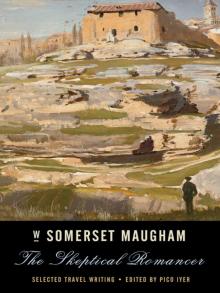 The Skeptical Romancer: Selected Travel Writing
The Skeptical Romancer: Selected Travel Writing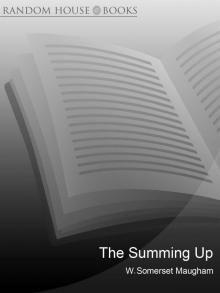 The Summing Up
The Summing Up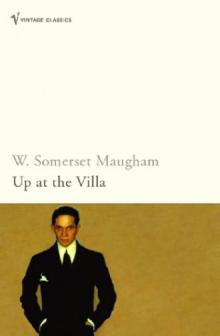 Up at the Villa
Up at the Villa The Razor's Edge
The Razor's Edge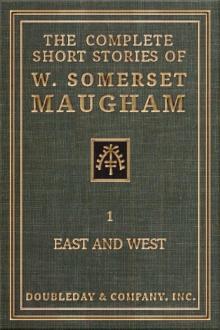 The Complete Short Stories of W. Somerset Maugham: East and West (Vol. 1 of 2))
The Complete Short Stories of W. Somerset Maugham: East and West (Vol. 1 of 2))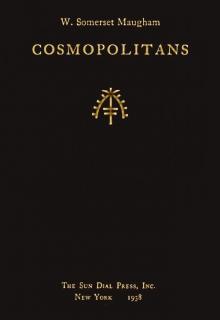 Cosmopolitans
Cosmopolitans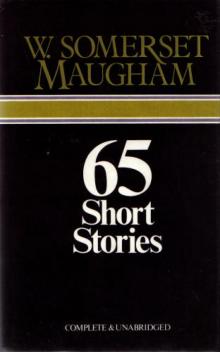 65 Short Stories
65 Short Stories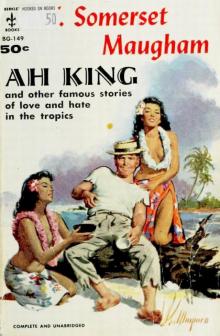 Ah King (Works of W. Somerset Maugham)
Ah King (Works of W. Somerset Maugham) Collected Short Stories: Volume 1
Collected Short Stories: Volume 1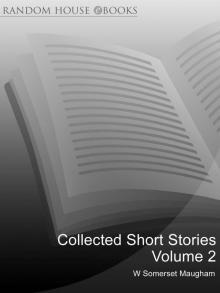 Collected Short Stories Volume 2
Collected Short Stories Volume 2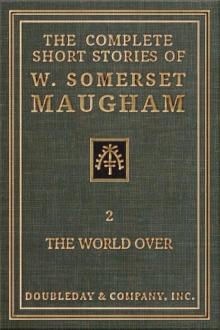 The Complete Short Stories of W. Somerset Maugham - II - The World Over
The Complete Short Stories of W. Somerset Maugham - II - The World Over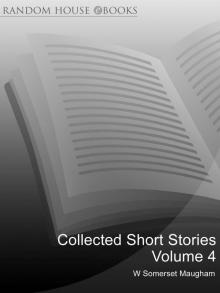 Collected Short Stories Volume 4
Collected Short Stories Volume 4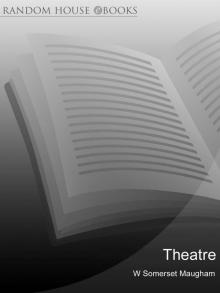 Theatre
Theatre Short Stories
Short Stories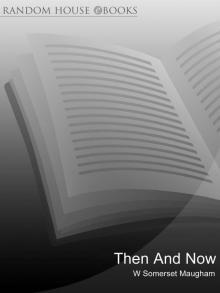 Then and Now
Then and Now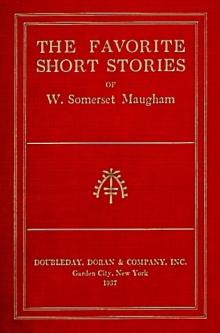 The Favorite Short Stories of W. Somerset Maugham
The Favorite Short Stories of W. Somerset Maugham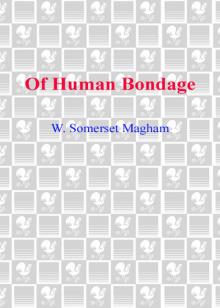 Of Human Bondage
Of Human Bondage The Magician
The Magician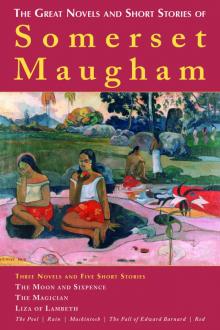 The Great Exotic Novels and Short Stories of Somerset Maugham
The Great Exotic Novels and Short Stories of Somerset Maugham A Writer's Notebook
A Writer's Notebook Christmas Holiday
Christmas Holiday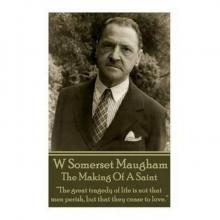 The Making of a Saint
The Making of a Saint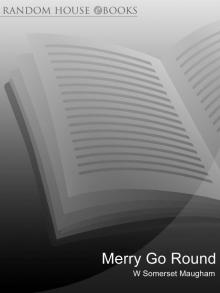 Merry Go Round
Merry Go Round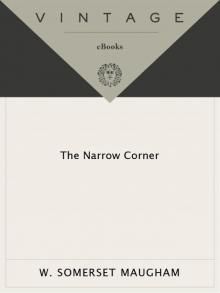 The Narrow Corner
The Narrow Corner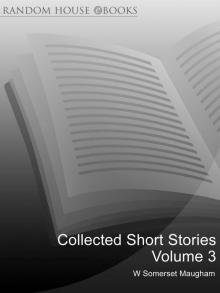 Collected Short Stories Volume 3
Collected Short Stories Volume 3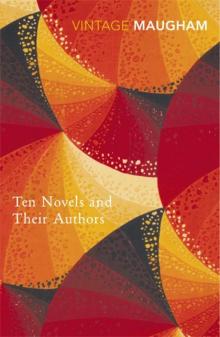 Ten Novels and Their Authors
Ten Novels and Their Authors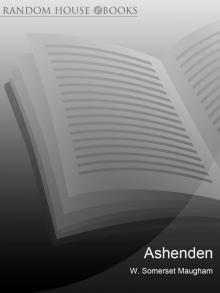 Ashenden
Ashenden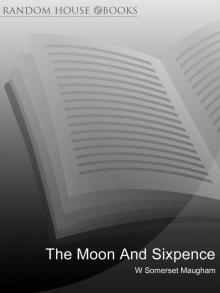 The Moon and Sixpence
The Moon and Sixpence Cakes and Ale
Cakes and Ale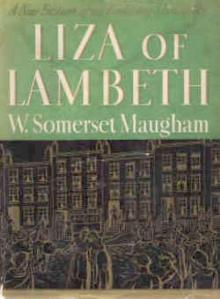 Liza of Lambeth
Liza of Lambeth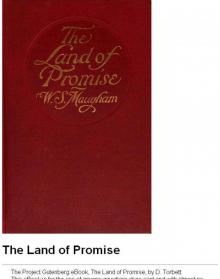 The Land of Promise: A Comedy in Four Acts (1922)
The Land of Promise: A Comedy in Four Acts (1922) A Writer's Notebook (Vintage International)
A Writer's Notebook (Vintage International)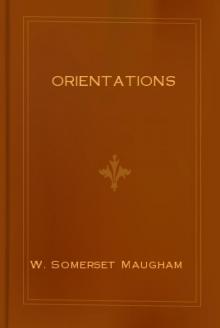 Orientations
Orientations Selected Masterpieces
Selected Masterpieces Mrs Craddock
Mrs Craddock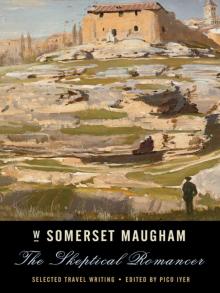 The Skeptical Romancer
The Skeptical Romancer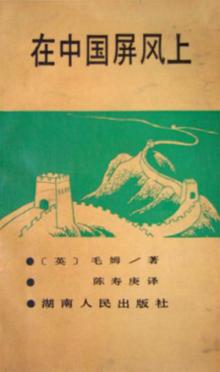 On a Chinese Screen
On a Chinese Screen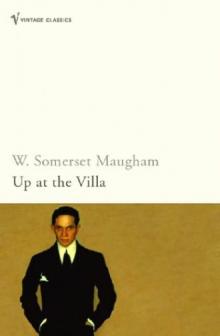 (1941) Up at the Villa
(1941) Up at the Villa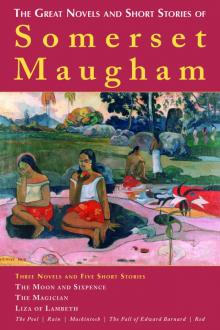 The Great Novels and Short Stories of Somerset Maugham
The Great Novels and Short Stories of Somerset Maugham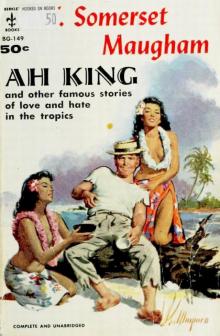 Ah King
Ah King The Explorer
The Explorer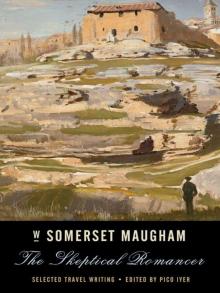 The Skeptical Romancer: Selected Travel Writing (Vintage Departures)
The Skeptical Romancer: Selected Travel Writing (Vintage Departures)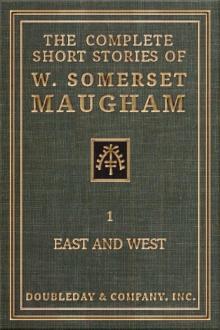 The Complete Short Stories of W. Somerset Maugham - I - East and West
The Complete Short Stories of W. Somerset Maugham - I - East and West